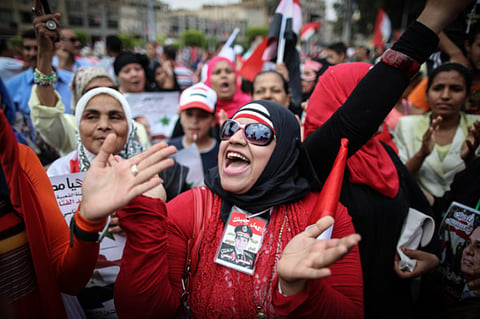Mohammad reaffirms ties between UAE and Egypt
Shaikh Mohammad Bin Zayed Al Nahyan reviews development projects

Cairo: General Shaikh Mohammad Bin Zayed Al Nahyan, Crown Prince of Abu Dhabi and Deputy Supreme Commander of the UAE Armed Forces, has re-affirmed that the UAE, under directives from President His Highness Shaikh Khalifa Bin Zayed Al Nahyan, will continue to support Egypt in the coming stage during which the country seeks to strengthen the pillars of stability, growth and development in order to face challenges and fulfil the ambitions and aspirations of the Egyptian people.
Shaikh Mohammad Bin Zayed was speaking as he viewed a presentation on development projects the UAE is implementing in Egypt’s sectors in order to provide tangible benefits for Egyptian citizens.
Egyptian Prime Minister Ebrahim Mehleb was present during the presentation given by the team of the office in charge of coordinating UAE-funded projects in Egypt.
Shaikh Mohammad Bin Zayed expressed his satisfaction at the progress of the UAE-funded development projects and praised the efforts the UAE team is making in coordination with Egyptians to complete the projects so as to benefit the Egyptian people as soon as possible.
The UAE projects in Egypt reflect the depth of fraternal and historical relations between the two brotherly countries that have been growing since establishment by Shaikh Zayed Bin Sultan Al Nahyan.
These projects are a continuation of his approach and vision for Egypt as well as his appreciation for its people and its important regional role. This progress would not have been possible without the positive atmosphere, the fraternal cooperation that dominates the relations between the two countries as well as the great efforts being made by the officials.
Dr Sultan Bin Ahmad Sultan Al Jaber, Minister of State, Khaldoon Khalifa Al Mubarak, Chairman of Abu Dhabi Executive Affairs Authority (EAA), Mohammad Bin Nakhira Al Daheri, UAE Ambassador to Egypt, and Mohammad Mubarak Al Mazrouie, Undersecretary of the Court of Abu Dhabi Crown Prince, were also present during the presentation on the projects. From the Egyptian side, Minister of Planning and International Cooperation, Ashraf Al Araby and Presidential Advisor Mustafa Hegazy, and other senior officials were present.
In the presentation, Minister Al Jaber, who leads the coordination office for UAE-funded projects in Egypt, said Egypt has now entered into a new stage of work and optimism.
“We continue to work with the Egyptian officials on a plan to reinvigorate the Egyptian economy and put it on the track of sustainable growth,” he said. He thanked the UAE leadership, namely Shaikh Khalifa and Shaikh Mohammad Bin Zayed for their support for Egypt, which he described as instrumental in making this progress and creating a unique model for development aid.
He noted that UAE has endorsed Saudi Arabia’s call in May for a donor conference for Egypt. “In light of this, we have the right to have an optimistic outlook.”
UAE-funded projects in Egypt include the construction of 100 schools — four were already completed in May — by the start of the new academic year in September, and sewage networks in 128 Egyptian villages. Eleven will be completed this month, with additional villages to be added to the project pending approvals from the Egyptian side in order to complete the whole project by May 2015. The sewage project will benefit more than 1.7 million people and create jobs for 23,000 workers.
Other UAE-funded infrastructure projects in Egypt include four bridges and 41 railway intersection facilities that will reduce accidents and bolster road safety.
In the UAE-funded social housing project, which launched in December 2013, work is underway to build 50,000 housing units in 18 Egyptian governorates for more than 250,000 people when completed in November 2014. The project will create 220,000 job opportunities.
Work is also underway to install solar panels for 6,818 houses, schools, mosques and health-care centres, to produce more than 64 million kilowatt-hours of electricity a year saving 19 million cubic metres of diesel and reducing carbon emissions by 53,000 tonnes a year.
UAE’s assistance to Egypt also includes a total of 600 buses, which will cover 30 per cent of public transport needs in Greater Cairo and create 2,400 permanent jobs.
Other UAE-funded development projects in Egypt include the construction of colleges in some governorates, a library and students’ dormitories for Al Azhar University. Also, the UAE has bought two buildings, one of them to house an orphanage, for the Coptic Church.
Among the UAE-funded strategic projects in Egypt are wheat silos with a storage capacity of 1.5 million tonnes, which will be built staring in November, and the building of 78 health-care centres (the project launched in December 2013) to serve 780,000 patients a year and create 6,000 jobs.
An insulin production line in Egypt already opened by UAE in April will fully meet Egypt’s market demand for the diabetes medication.
In December this year, UAE will complete a vaccine and sera production facility in Egypt to boost the country’s self-efficiency, create more jobs and preserve the quality of domestic production.
In addition, UAE is working with the Egyptian government on a plan aimed at reducing the country’s deficit, attracting foreign investments and creating more jobs for Egyptians.



